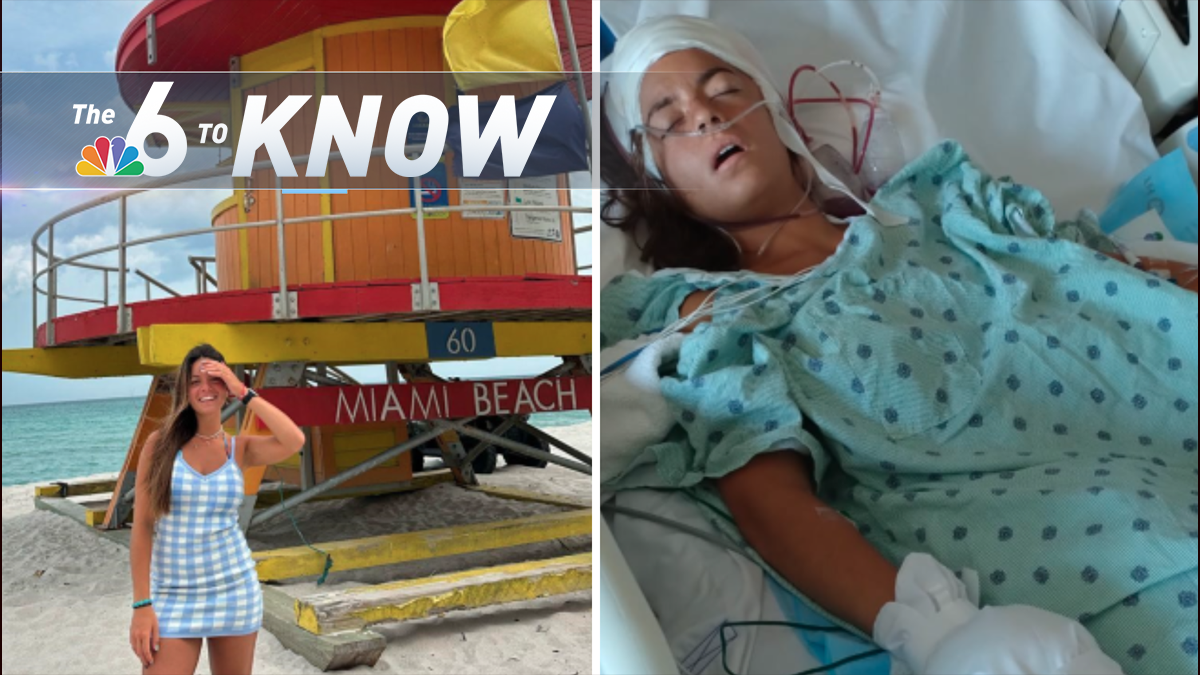A man has filed a lawsuit against Carnival Cruise after his wife died after going overboard. NBC 6’s Willard Shepard reports.
Mother’s Day brings with it a pain that won’t go away for Karl Broberg.
“I just remember collapsing on the floor,” he said of the holiday weekend in May 2016 when he got a dreaded phone call.
On the other end of the line was the U.S. Coast Guard. His wife Samantha had been lost at sea. Broberg practiced his words to their four kids that mom wouldn’t be coming back home from the cruise. It didn’t help.
“I explained to them that their mother was gone,” he said. “It was just a horrible accident.
His wife's first cruise was supposed to be a weekend getaway with girlfriends — a few days of fun while Karl cared for the family's four kids.
“Something that was on her bucket list that she had always wanted to do,” Broberg said.
“There were a bunch of text messages right as she was boarding the ship,” he remembered. “How excited she was and all the things she was seeing and doing.”
Local
The next morning he got a call from one of her friends that she was missing. The ship posted an image of her for passengers to be on the lookout. In news reports at the time, passengers described the crew as going cabin to cabin trying to find her.
One passenger said, “We knew it wasn’t going to end well.”
Hours later, he got the call from the Coast Guard then would soon learn the details of his wife’s last hours. Those details are laid out in a federal lawsuit just filed against Carnival Cruise Lines.
Samantha Broberg was described as being “visibly and highly inebriated.” The lawsuit says the crew knew that but continued serving her alcohol. Video showed Broberg go to Deck 10 then step on a chair to climb to the railing. She sat with her back to the water and fell backward into the Gulf of Mexico. That was at 2:04 a.m.
The ship had infrared cameras that showed the fall, but no one knew her fall was caught on video until much later.
Broberg’s attorney, Miami’s Robert Gardana, claims Carnival sent no alert, didn’t slow or stop, didn’t turn around, or send a lifeboat.
“The Carnival Liberty Captain did not inform the United States Coast Guard that she went overboard until about 15 hours after she had been captured on the thermal camera,” Gardana said.
In an email, a Carnival spokesperson wrote, “The ship’s railings meet or exceed safety requirements and Samantha Broberg unfortunately chose to climb up, and sat on the railing before falling.”
Broberg says his lawsuit is for damages and to push ships to have systems that not only have cameras, but also can detect and send an alert when someone goes overboard.
“When you look and you see how many people have fallen off cruise ships to their death, you just can’t believe there’s some sort of technology that’s affordable to them in place where this could be prevented,” Broberg said.
Cruise industry expert Dr. Ross Klein has tracked the number of people who go overboard from cruise ships. His research on cruisejunkie.com shows nine passengers have gone overboard so far in 2017 and 294 people since 1995.
“There is normally nobody watching video,” said retired Coast Guardsman Dave Leone.
Leone’s company, Radio Zeeland DMP Americas, thinks it has an answer: a basketball-sized device that can be mounted on cruise ships. It uses cameras and lasers to detect when a passenger falls over.
Leone says he has tested it at sea by throwing plastic dummies over the rail.
"Either the camera or the laser sensor pick up the motion,” Leone said. “It will then immediately send a signal to the bridge or the console or the security officer, and it will automatically pop up on their device showing what is happening at that moment."
Leone says the captain could then decide what emergency steps to take.
He believes a system that notifies the crew immediately when someone has gone overboard could save lives.
He says no cruise line has purchased or implemented the system his company created. Leone says his product would cost about $1 million to install on a large vessel.
Carnival’s spokesperson wrote, “All of our ships have man overboard cameras and for several years now our company has been testing man overboard alarm systems. Historically these systems have been unreliable, generating a significant number of false alarms. The technology has been gradually improving and we continue to actively test it on our vessels.”
Broberg and Gardana believe the time has come for cruise lines to act.
“I think it’s incumbent on the industry to take a good hard look at what’s going on the cruise ships and make an effort to not only have image capture but to have detection,” Gardana said.
“Just put some safety mechanisms in place so no one else has to go through something like this,” Broberg said.
A bill has been proposed in Congress that would require the immediate notification of a person overboard.
“The statute would require both capture and detection to have that instantaneous alarm,” Gardana said.



